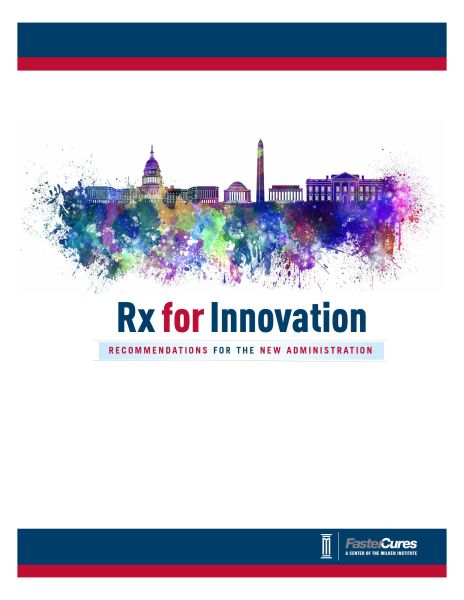
Rx for Innovation: Recommendations for the New Administration
FasterCures wants President-elect Donald Trump to be ready to address biomedical innovation on day one.
Biomedical innovation is vital to America's health and economic well-being. However, these benefits, and U.S. leadership in the life sciences, did not happen by accident and are not guaranteed to continue indefinitely.
Decades of federal commitment to funding biomedical research and promoting innovation through policy are responsible for the benefits we see today. The next president will need to lead in this area and construct policies to maintain the system’s strength and productivity.
Our process
FasterCures was founded to shine light on the biomedical innovation system and all its interconnected components: government, academia, industry, patients and others. Since our founding, we've set out to identify and solve the obstacles to progress in the system.
 For this project, we engaged our unique network of stakeholders across the R&D ecosystem. Specifically, FasterCures staff interviewed more than 150 thought leaders across eight sectors. We combined insights from the interviews, discussions from a working session in Washington of health policy leaders and feedback received via our Web site to identify ideas for how to propel biomedical innovation forward. The Rx for Innovation report, prepared and authored by the FasterCures policy team, presents our recommendations for how the next administration can translate the ideas we heard into meaningful action.
For this project, we engaged our unique network of stakeholders across the R&D ecosystem. Specifically, FasterCures staff interviewed more than 150 thought leaders across eight sectors. We combined insights from the interviews, discussions from a working session in Washington of health policy leaders and feedback received via our Web site to identify ideas for how to propel biomedical innovation forward. The Rx for Innovation report, prepared and authored by the FasterCures policy team, presents our recommendations for how the next administration can translate the ideas we heard into meaningful action.
We have distilled our findings down to eight areas, and you'll see our recommendations below. All of these actions, many of which are quite challenging, are worth taking. That is why it is vitally important for President-elect Trump and his administration to commit to overcoming barriers and bringing the system together for the benefit of not only all Americans, but also all humanity.
This is our prescription for innovation.
Our findings
- Everyone is -- or will be -- a patient. Emerging from our interviews, and reflected throughout our recommendations, is the conviction that a new "#HealthCitizenship" movement can enable citizens -- both healthy and ill -- to engage with researchers, industry and regulators in important ways.
- Innovators want system-level action within biomedical R&D and the health system as a whole. The president has an opportunity to convene thought leaders, build bridges between sectors and within government and take necessary steps to make the system work, as a system.
- Patient centricity is now recognized as a key component of biomedical innovation. But we have a lot of work to do to translate patient perspectives to better inform research, product development and health-care delivery. It's critical that the next president support the current trajectory and invest in the science of patient input, which is vital both for biomedical R&D and for the health-care value equation.
- The U.S. Food and Drug Administration (FDA) is a linchpin to innovation; the administration must support what is underway while filling unmet resource needs. FDA leadership is on the right track and is promoting innovations throughout the medical product regulatory process. However, the agency lacks adequate resources and human capital required toaccomplish its vitally important mission.
- The government can play an important role in building bridges across a "Valley of Death" to more efficiently translate basic science discoveries into new medical products. The National Institutes of Health's National Center for Advancing Translational Sciences was created to help build these bridges, and it should be given all the tools necessary to accomplish its mission. Innovative R&D models and financing tools should also be explored and deployed, in conjunction with ongoing support for the basic science that provides the building blocks for these later stages of R&D.
- It's time to create a revolution in clinical trials, and the government can contribute by enabling new technologies and accelerating existing efforts to strengthen them. We found universal dissatisfaction with the current timelines and costs of clinical trials. By supporting new tools like real-world evidence, telemedicine and mobile health, the federal government can play an important role in catalyzing progress.
- We need to make a final push toward health data interoperability, open data for research and a robust data infrastructure. Every facet of the innovation system needs good data, and government has a central role in ensuring the free flow of data among patients, health-care providers and innovators. The current landscape of data-sharing bottlenecks and disconnected silos is harming long-term prospects for innovation.
- Access is a growing hurdle, and new efforts must be made to ensure that patients can access innovative therapies and cures in a sustainable way. In the same way the FDA has embraced and, at times, struggled with the new paradigm of patient input, the Centers for Medicare and Medicaid Services has an opportunity to bring patients into the equation as it transitions to a value-based system.

